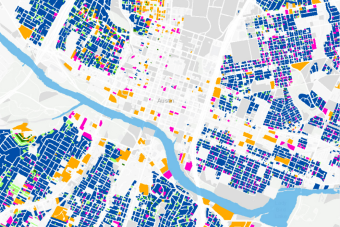Overview
Meeting the demand for the full spectrum of affordable housing shall be an integral part of any growing city conferring economic and social benefits that underpin sustainable growth and stable communities. Rapid population growth coupled with massive migration into the city have caused the demand for homes to soar and along with it, prices. Additionally, massive corporate projects, such as Apple, Tesla, and Samsung's new campuses in Austin, will trigger a new chain of social and economic changes. These changes will reshape the local communities via an alteration to the local housing market.
A well-functioning and affordable housing market is considered as one of the key ingredients of sustainable and stable urban communities. To this end, our aims are to develop and release a comprehensive set of housing market data and develop a computational framework to study ingredients that shape the housing market. To archive the above aims, we (1) curate, aggregate, and publicly release a set of housing market data, (2) measure the key drivers of the housing market and how they change with respect to the socio-economic status of neighborhoods, and finally (3) establish a novel fairness framework to measure the social disparities in access to affordable housing.
Findings
Between 1990 and 2019, the quantity of affordable single-family homes fell from 20% of all homes to only 2%, a staggeringly low proportion. Property values citywide have also increased at a faster rate than median income during the past 15 years.
Of the affordable homes that remain today, two promising options include single-family lots with mobile homes, which make up less than 1% of all single-family homes in Austin, and small condominium units located in older apartment-style complexes.
Austin could increase the number of affordable units by providing more lots for single-family manufactured homes and converting old apartment complexes into condo units to purchase.


Austin Housing Map
Explore interactive maps on housing unit type and affordability generated through an analysis of over 30 years of Austin housing data.
Team Members
Amin Azimian
Mingyuan Zhou
Cara Bertron
John Clary
Matt Dugan
Molly Emerick
Matt Hollon
Jacquie Hrncir
Sarah Smith
Documents
Select Publications
Junfeng Jiao, Seung Jun Choi, and Weijia Xu. “Tracking Property Ownership Variance and Forecasting Housing Price with Machine Learning and Deep Learning.” 2021 IEEE International Conference on Big Data (Big Data).
Junfeng Jiao, Kent Hansen, and Amin Azimian. “Land Value Impacts of Airbnb Listings on Single-Family Homes in Austin, Texas, USA.” International Journal of Housing Markets and Analysis.

